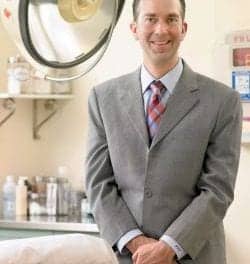The economy is tight, and people are watching how they spend their money more carefully. That’s the cue for what I call The Physician Wars.
Have you ever had a carpenter come to your house to do a remodeling job? He looks around the room and invariably asks, “Who messed up the work on this house?” It seems that no matter what, the guy who did the job before him did it all wrong.
 |
It’s the same with physicians. A former employee of mine called to tell me she had applied for a job at a neighboring plastic surgeon’s office. When the plastic surgeon found out she had worked for me, he harangued her for a full half hour on what a bad surgeon I am and how he fixes all my bad results. He must be hurting.
The episode reminds me of when a facial plastic surgeon in my area found out that one of his patients was consulting me. He told her, “Why he’s … he’s… a dermatologist!” Oh my goodness. The word is out. Who among you has not heard that oral maxillofacial surgeons performing cosmetic surgery are … dentists?
The anesthesiologists disparage the anesthetists, the orthopedic surgeons disparage the podiatrists, the internists disparage the family practice docs, cosmetic surgeons disparage gynecologists who perform cosmetic procedures, and everyone complains about the salons and spas.
This feels like the plight of a Christian Scientist with appendicitis. Does anyone remember the erroneous article in 2000 in the Journal of Plastic and Reconstructive Surgery that alleged a 1-in-5,000 mortality rate from liposuction? We all suffered from that one—malpractice insurance in Illinois has yet to recover.
All of this complaining is done under the guise of advising patients about the risks and benefits of medical and surgical care. It is, of course, self-serving and debasing.
Certainly, patients can detect the defensiveness in these attacks. If a physician is willing to disparage other practitioners in the privacy of his office, what might the same person say about his patients?
 |
Without delay, I constructed rules to judge the ethical conduct of physicians. No one asked for them, but they are needed:
- In patient consultations—and just about everywhere else, for that matter—a physician who openly disparages other physicians is not focusing on the patient’s needs.
- Physicians should always reveal their own work (as in before-and-after photos or their experience in treating a given condition).
- Physicians should communicate with other physicians when unsure about a diagnosis or when the patient is not progressing as well as anticipated.
- Physicians who promise perfect results are not perfect.
- Physicians who do not touch or examine their patients before surgery should not be touching them during surgery.
- Physicians who bill insurance for medically unnecessary procedures (cosmetic) are as likely to lie to their patients as to insurance companies.
- Physicians who don’t have time to sit down with their patients cannot hear what their patients say.
Ultimately, we are the purveyors of care and trust. Despite the internecine hostilities that emerge in our profession during tough economic times, patients pay us great honor by trusting their health and their appearance to our care.
|
See also “Patient Tracking During an Economic Slowdown” by Catherine Maley, MBA, in the June 2008 issue of PSP. |
This is what makes the pressures of medical careers tolerable. When we listen to our patients, when we ask ourselves what is this patient trying to say, we not only respond to our patient’s needs, we become empathetic. At that point, there is no time for self-righteous indignation and no need to disparage the care-giving abilities of a colleague.
It is an old adage that when a patient gives you a history that accuses another physician of providing poor care, you are only one physician away from being accused yourself.
Be an educated provider. Stay compassionate and be part of the cure, not the problem.
Edward B. Lack, MD, is a board-certified dermatologist and board-certified dermatologic cosmetic surgeon. He is president and medical director of MetropolitanMD, a multispecialty cosmetic surgery center in Chicago. In addition, he was a past president of the American Academy of Cosmetic Surgery. He can be reached at (847) 832-6700.




